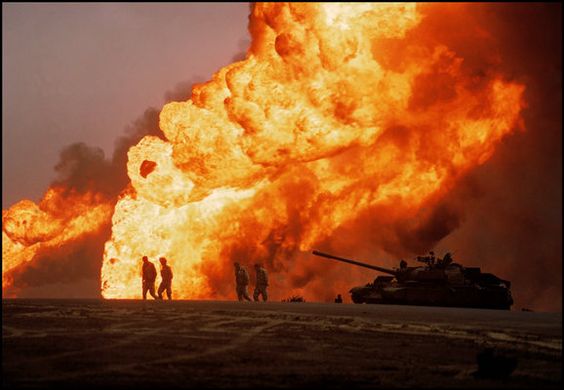The war in Syria is in its 5th year, and it is all part of a global plan to invade several countries based on two factors; controlling the flow of oil and international banking influence.
Ordo Ab Chao
The reasons why the US and NATO are intervening in Syria are complex, but the two most common denominators are Oil and Banking.
If you live in a country that doesn’t have a central bank that is controlled by the international banking cartels, but does have a strategic position for producing, manufacturing, or transporting oil, it is likely that your country will be invaded next.
It is part of a plan to take down 7 countries, and the excuses for invading have all been under the pretexts of either weapons of mass destruction, an out-of-control dictator, or the presence of terrorists.
It turns out that almost all accusations have been false, and that the United States actually armed, funded, and provided support to each regime and terrorist organization it now wishes to topple.
Based on the list of 7 countries the US plans to topple, the most likely candidate for the next invasion is Lebanon, but first I will go through the history to explain how it fits in a historical and practical context.
7 countries outlined to invade in 2001
https://www.youtube.com/watch?v=9RC1Mepk_Sw
US General Wesley Clark revealed that as far back as 2001, he received a memo that came from former Secretary of Defense Donald Rumsfeld’s office with a list of seven countries the Americans and their allies were going to invade following 9/11.
They are Syria, Iraq, Lebanon, Libya, Somalia, Sudan, and Iran.
American author Ellen Brown wrote a fantastic article in 2011 called LIBYA: ALL ABOUT OIL, OR ALL ABOUT BANKING? in which she drew the connection between the above countries.
“What do these seven countries have in common? In the context of banking, one that sticks out is that none of them is listed among the 56 member banks of the Bank for International Settlements (BIS). That evidently puts them outside the long regulatory arm of the central bankers’ central bank in Switzerland,” wrote Brown.
Since the list of 7 countries was devised, the regimes in Iraq and Libya have been toppled, and South Sudan was partitioned in 2011. All three countries had booming oil industries that their leaders wished to capitalize on for building infrastructure within the respected countries.
Iraq
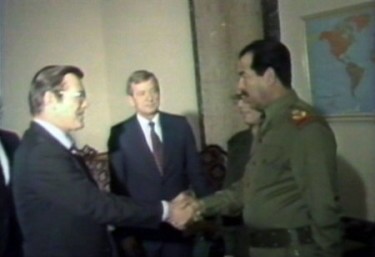
Secretary Rumsfeld with Saddam Hussein
Saddam Hussein did not want to accept the petrodollar for Iraqi oil, which was against the interests of the banksters in the US. He was subsequently removed from power, executed, and Iraq has been destabilized since being invaded in 2003.
A petrodollar is “a U.S. dollar that is received by an oil producer in exchange for selling oil and that is then deposited into Western banks.”
Saddam wished to use the Euro as the currency for dealing with oil. A Time magazine article from 2000 states, “Iraq says it will no longer accept dollars for oil because it does not want to deal ‘in the currency of the enemy.'”
The US-led coalition invaded Iraq three years later under the false pretext that Saddam had weapons of mass destruction that he would use against the world and his own people.
Libya
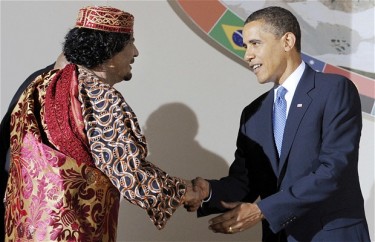
Gadaffi with President Obama
In Libya, Gaddafi also didn’t trade oil for US dollars, which are created by the private banking cartel known as the Federal Reserve. Instead, Gaddafi wanted to create a whole new gold-backed African Dinar, and he met with the same fate as Hussein.
Gaddafi was portrayed as mad dictator, but in Libya, the state-owned banks provided free education and healthcare, newlyweds received $50,000 in interest-free loans to start a new life, and gas and bread were the cost of a penny.
Even before a new system of government was put in place, the Libyan rebels suspiciously announced that they had created a central bank, which according to the Economic Policy Journal, “suggests we have a bit more than a rag tag bunch of rebels running around and that there are some pretty sophisticated influences.”
The official reason for US intervention in Libya was, “Gaddafi was suppressing his people and that ‘left unchecked,’ we have every reason to believe that Gaddhafi [sic] would commit atrocities against his people.”
Sound familiar to Iraq? It is. Adding more condemning evidence as to the real motives are leaked emails from former Secretary of State and current US presidential hopeful Hillary Clinton.
“Admissions of rebel war crimes, special ops trainers inside Libya from nearly the start of protests, Al Qaeda embedded in the U.S. backed opposition, Western nations jockeying for access to Libyan oil, the nefarious origins of the absurd Viagra mass rape claim, and concern over Gaddafi’s gold and silver reserves threatening European currency,” were all reasons revealed by Clinton’s emails as to why the West intervened in Libya. Oil and banking.
Syria
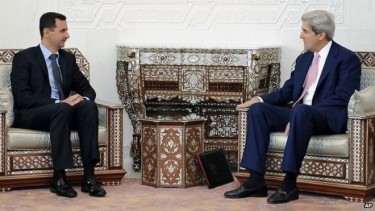
Secretary Kerry with President Bashar al-Assad
One very important factor why Syria is under attack is that Syria has a state-owned central bank that isn’t controlled by the international banking cartels, just like Libya once had.
Syrian President Bashar al-Assad is currently portrayed as another fascist dictator who uses weapons of mass destruction against his own people. However, one report stated that clashes between the US-backed rebels and the Islamic State were responsible for chemical weapons being deployed.
“Either they (IS) gained the ability to make it themselves, or it may have come from an undeclared stockpile overtaken by IS. Both are worrying options.”
The other factor for intervention in Syria is a proposed pipeline worth billions of dollars that has the US, Saudi Arabia, and Russia all in competition with one another.
“Much of Russia’s power comes from established pipelines used to transport gas to Europe cheaply. But other countries are now trying to get around Russia and provide new sources of gas to Europe,” according to an Australian News report.
EcoWatch reported that the “war against Bashar Assad did not begin with the peaceful civil protests of the Arab Spring in 2011. Instead it began in 2000 when Qatar proposed to construct a $10 billion, 1,500km pipeline through Saudi Arabia, Jordan, Syria and Turkey.”
Will Lebanon be the next country to invade?
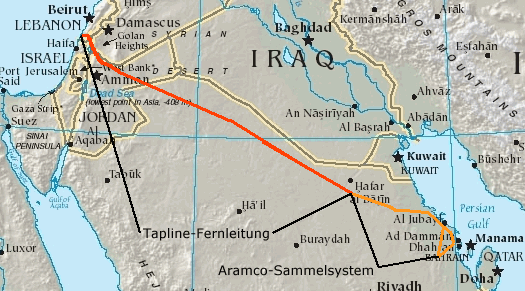
Proposed Trans-Arabian Pipeline
Lebanon is not only on the list of 7 countries to invade, it also is a strategic location for the proposed Trans-Arabian pipeline that goes from Qatar to Iraq, Syria, and Jordan until it reaches Lebanon with its ports on the Mediterranean Sea.
Intervention attempts in Iran have proved most difficult to procure, but Lebanon is in a vulnerable position in the Middle East.
As coalition forces have pushed the Islamic State from Iraq into Syria, the next step may be to keep pushing them westward and into Lebanon — a country that has become weakened and divided along sectarian lines.
According to New Eastern Outlook, the goal of the Islamic state “has been clear and simple: to regroup in Lebanon, to create strong and effective cells, and then to strike when the time is ripe. The ‘dream’ of the ISIS is a mighty Caliphate in the north of Lebanon, preferably with full access to the Mediterranean Sea.”
However, if ISIS ever reaches Lebanon, it will be the perfect pretext for the US and/or NATO to invade. If you ever see in the news that ISIS is in Lebanon and that coalition forces will have to intervene to stop terrorism, DON’T YOU BELIEVE IT FOR ONE SECOND!
It will be part of a plan over a decade in the making to take control of oil routes, but the official reason for invading will be to combat the Islamic State — a group that was established as a response to the power vacuum in Iraq as a direct result of the United States’ involvement in destroying the country’s infrastructure.
What started in Iraq spread to Syria, and is now on the border of Lebanon, and if war does come, the Lebanese will suffer heavy consequences as part of a bigger, global agenda on the part of big oil and international banking interests.
Following General Clark’s statement in 2001 and the pattern from Iraq, Libya, and Syria, Lebanon is poised as the most likely candidate for invasion in the near future.



